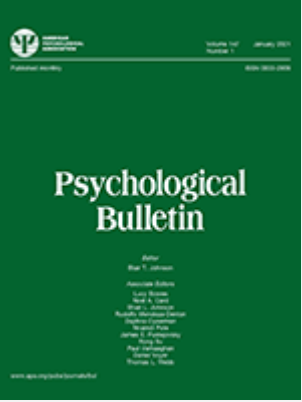文化流畅的理论、元科学和科学进步:一个案例:对Macnamara和Burgoyne(2023)以及Burnette等人(2023年)的评论。
IF 17.3
1区 心理学
Q1 PSYCHOLOGY
引用次数: 2
摘要
本文章由计算机程序翻译,如有差异,请以英文原文为准。
Culturally fluent theories, metascience, and scientific progress: A case example: Commentary on Macnamara and Burgoyne (2023) and Burnette et al. (2023).
求助全文
通过发布文献求助,成功后即可免费获取论文全文。
去求助
来源期刊

Psychological bulletin
医学-心理学
CiteScore
33.60
自引率
0.90%
发文量
21
期刊介绍:
Psychological Bulletin publishes syntheses of research in scientific psychology. Research syntheses seek to summarize past research by drawing overall conclusions from many separate investigations that address related or identical hypotheses.
A research synthesis typically presents the authors' assessments:
-of the state of knowledge concerning the relations of interest;
-of critical assessments of the strengths and weaknesses in past research;
-of important issues that research has left unresolved, thereby directing future research so it can yield a maximum amount of new information.
 求助内容:
求助内容: 应助结果提醒方式:
应助结果提醒方式:


